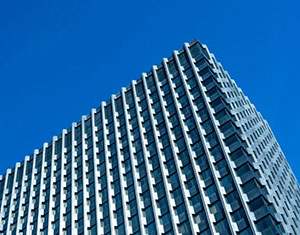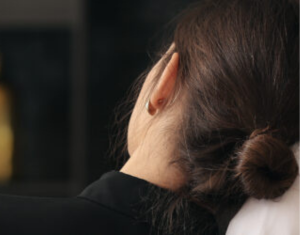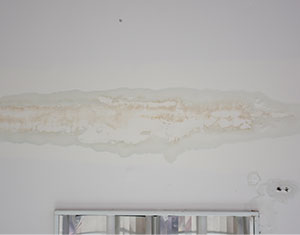Table of Contents
- What Happens in a Roof or Ceiling Collapse Injury?
- Proving Negligence & Causation in an Atlanta Roof or Ceiling Collapse Case
- Compensation & Damages Recoverable in a Georgia Ceiling Collapse Lawsuit
- Types of Injuries Suffered From Roof or Ceiling Collapse
- Further Reading on Roof and Ceiling Collapse Inuries
What Happens in a Roof or Ceiling Collapse Injury?
Whether you’re at your own home, at someone else’s home, in a public place, or in a business like a restaurant, the last thing you’d expect is for the ceiling or roof to collapse and fall on you. It can happen without warning, and no matter the venue, there is a real chance of suffering serious injuries.
This type of structural failure can happen for any number of reasons. The most common factor in a ceiling collapse is some form of negligence. Falling beams, drywall, and debris can lead to major and sometimes catastrophic injuries. Sagging ceilings are usually the first sign of a potential collapse, but they may go unnoticed by a tenant or homeowner.
In older homes, apartments, and buildings, roofs and ceilings may collapse if they were not properly maintained by the owners or previous owners. One of the most common causes is leaks above the ceiling or in the attic of a home, apartment, or commercial building. Pipe bursts during freezing weather may not be obvious immediately, but the leaking will start when the ice begins melting. Improperly repaired leaks slowly cause ceiling materials to soften until the weight of the soaked materials causes everything to fall.
Further Reading: Suing a Property Management Company for Negligence?
Proving Negligence & Causation in a Ceiling or Roof Collapse Injury Case in Georgia
To build a case for liability following a Georgia ceiling collapse, we need to first identify the source of the collapse, which is usually moisture. Leaking plumbing systems and roofs, as well as condensate drainage from appliances and air conditioning units, are often the sources. We work with expert witnesses to conduct a site inspection that will examine the trail of mold, moisture, and staining to suspected sources. Once we know this, we can work backward to try to ascertain when the issue developed.
Sometimes, these issues crop up in as little as 24 hours. However, most of the time there is evidence the problem has been developing for weeks, months, or even years — particularly when mold is present. When the evidence points to this being an issue for some time, it allows us to build a case for negligence in inspections or maintenance.
Establishing Negligence in Injury Cases
Under Georgia’s premises liability laws, the building’s owner is responsible for ensuring that a place is safe and complies with current building codes. If not, they can be held liable for the injuries suffered on their premises that result from their negligence. But tenants can also be held liable if they are partly responsible for the collapse.
An injured plaintiff must prove with these four points that their injuries resulted from the owner’s negligence:
- That the owner and/or occupier (such as employees at a business) owed you a duty of care as a visitor, customer, etc., under Georgia Code § 51-3-1, unless you were trespassing.
- That the owner and/or occupier breached that duty by failing to remedy the hazard within a reasonable amount of time or set out a warning (such as a “wet floor” sign), assuming they knew about the hazard.
- Your injuries are the direct result of the breach of that duty of care.
- You suffered injuries and damages from the breach of the duty of care.
A plaintiff must show that the defendant was “more likely than not” responsible for the accident that led to injuries and losses. This is where an experienced Atlanta ceiling collapse attorney can help you with evidence gathering and building your case.
Further Reading: Understanding Foreseeability in Negligence & Premises Liability
Compensation and Damages Recoverable in a Roof or Ceiling Collapse Injury
Injuries from a roof or ceiling collapse can be serious, even catastrophic, leading to large medical expenses and losses. In some cases, a permanent disability can result, thereby preventing someone from earning a living.
For this, you may be able to recover damages for hospital and medical expenses like X-rays, prescriptions, physical therapy, and medical equipment, such as a wheelchair, crutches, or other assistive devices.
Beyond medical expenses, you may be able to receive compensation for:
- Lost earnings.
- Lost future earnings.
- Property damage.
- Relocation expenses (for renters).
- Pain and suffering.
- Other related expenses.
In a wrongful death claim, a survivor may be able to recover compensation for:
- Hospital bills.
- Funeral, burial, and other final expenses.
- Loss of consortium.
- Loss of inheritance.
You only have two years to file your claim for a roof or ceiling collapse. After that, your lawsuit will be dismissed. Therefore, it’s important to seek the advice of an Atlanta ceiling and roof collapse attorney as soon as you can to make sure your rights are protected, and you can receive the maximum compensation available.
Further Reading: Your Guide to Suing For Wrongful Death In Georgia Civil Courts


















